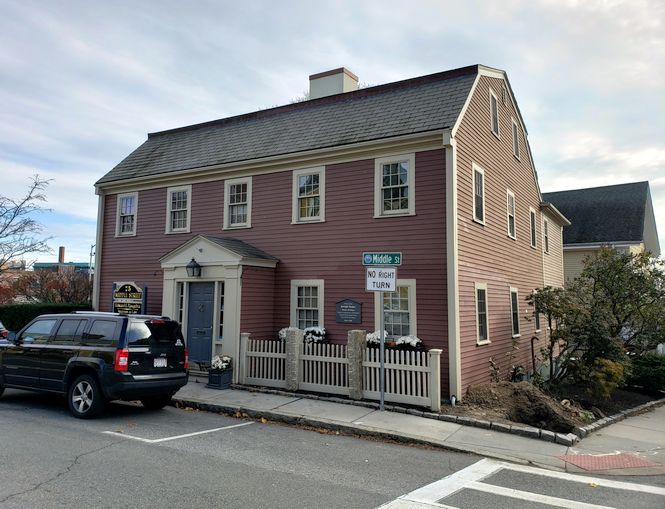Joseph Foster House (1760)

Erected circa 1760, the gambrel roof house at 75 Middle Street in Gloucester was the home of a merchant and Revolutionary War patriot named Joseph Foster (1730-1804). Originally from Ipswich, he became a ship captain, trading with the West Indies. He commanded privateers during the war and was a member of the Committee of Correspondence and the Massachusetts Constitutional Convention of 1779-1780.
At the start of the Revolutionary War, Foster was a hero of the Battle of Gloucester. On August 8, 1775, the Bristish sloop HMS Falcon, commanded by Capt. John Linzee, attacked two American schooners heading for Salem. He captured one, but the other escaped to Gloucester harbor and was grounded near Five Pound Island. Capt. Linzee sent barges with men to seize the grounded vessel, but local defenders, Joseph Foster playing a conspicuous part among them, fired on the British and effectively trapped them. In an attempt to distract the townspeople and relieve pressure on his men, Linzee fired Falcon‘s guns on the town of Gloucester, hitting the steeple of the First Church meeting house. He also sent a landing party to set fire to the town, but his men were captured by the locals. He then sent in his captured schooner, but its crewmen revolted and seized the ship. Linzee sailed off on the Falcon.
As related in The grandchildren of Col. Joseph Foster (1885), quoting from Babson’s History of the Town of Gloucester, Cape Ann:
It was in 1779, a “period of great poverty” in Gloucester, when paper money had “depreciated to about one-seventieth of its nominal value,” and “about one-sixth of the whole population were” “living chiefly upon charity,” “that a large troop of women, in want of the necessaries of life, marched to Col. Foster’s store, and made known their determination to supply themselves with provisions and groceries from his stock, in spite of all resistance. Some of the number were prepared to take an exact account of the articles delivered to each person, with reference to payment, if they should ever he able to pay; but, pay or no pay, they would have them, and proceeded to help themselves accordingly. This merchant was one of the most ardent patriots of the town; and it is related of him, that his conduct on this occasion proved him to be one of the most benevolent: for the tale of suffering and destitution that the women had to tell so touched his feelings, that he liberally supplied their wants, and dismissed them with words of the utmost kindness and sympathy ”
After the war, Capt. Foster returned to his farm. The house in town remained in the family until 1859. Since then it has had a number of owners and gone through alterations, serving at different times as a dry goods store, a piano and sweing machine shop, a confectionery shop, the Trust Department of the Cape Ann Bank & Trust Company, and now as offices.